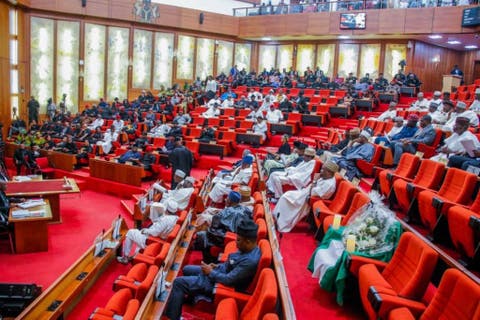Senate Begins Screening Of 8 Supreme Court Justices
***says poor renumeration could compromise judges
The Senate on Wednesday began the screening of eight supreme court justices nominated by President Muhammadu Buhari.
The nominees are: Hon. Justice Lawal Garba (North West), Hon. Justice Helen M. Ogunwumiju, (South West), Hon. Justice Addu Aboki (North West), Hon. Justice I. M. M. Saulawa, (North West), Hon. Justice Adamu Jauro, (North East); Hon. Justice Samuel C. Oseji, (South South), Hon. Justice Tijjani Abubakar, (North East), and Hon. Justice Emmanuel A. Agim, (South South)
The Chairman, Senate Committee on Judiciary, Human Rights and Legal Matters, Opeyemi Bamidele, decried the poor renumeration of the judges, saying this could compromise the judges in the course of their work.
He said, “The present situation in the country as regards welfare of judges and Justices call for a major intervention.
“Salaries and allowances of Judicial officers, Judges and Justices in Nigeria, were last reviewed in 2008 through an Act of Parliament.
“As at that time, exchange rate of Naira to a US dollar was N117 as against N467 it is now, clearly showing that Judges and Justices’ salaries have been static over the years and even depreciating in value,” he said .
Specifically, Bamidele said the take home pay of the Justice of Supreme Court per annum as far as basic salary was concerned is N2.477 million, while those of the Court of Appeal is N1.995 million and Judges of the High Court , N1.804 million.
He said on monthly basis , the total take home pay of Justices of Supreme Court individually is N753,000 while those of the Court of Appeal , are paid N608,000 each and the High Court Judges , N556,000.00 each .
He said, “The enumerated poor take home packages for Judges and Justices, clearly, show that they are not being fortified in anyway against temptation on the line of duty.”
He added that in South Africa, the Chief Justice collected the highest salary aside members of his family, adequately taken care of, as required measures against temptation and corruption .
The Deputy President of the Senate , Ovie Omo-Agege, said issues of judges’ remuneration were very critical and required urgent attention by the government, especially, the National Assembly.
He challenged the federal lawmakers to sponsor a bill for the upward review of the 12 year old Salary structure of the Judicial officers, Judges and Justices.
A mild drama ensued among members of the committee on mode of action to be be adopted when the screening began with Justice Mohammed Lawan Garba.
Senator Chukwuka Utazi raised an observation that it would be better for the screening of the Supreme Court judges to be held under closed doors away from the public.
However, Senator James Manager kicked against Utazi’s observation and noted that there was no time that Supreme Court judges nominees were screened behind closed doors since he has been in the Senate,
He insisted that Utazi’s observation lacked precedence and should be discarded since there were interested members of the public especially civil society organisations like the Nigerian Bar Association and media in attendance.
Senators Peter Nwaoboshi, Bala Na’Allah and Abdullahi Adamu agreed with Manager’s insistence that the screening of the Supreme Court judge nominees.
However, Senator Ike Ekweremadu backed Utazi but said that members of the judiciary committee could go into a closed-door session without the nominees so that modalities for the screening would be perfected and adopted.

Efforts by the Chairman to subject the observations to a vote so that the issue would be resolved also hit a brickwall.
Immediately he asked that the issue be put to vote, some senators said it would be better if the committee’s voting decision was taken behind the cameras.
The arguments almost stalled the screening process but interventions by ranking senators and House of Representatives members in attendance led by the Chairman, House Committee on Judiciary, Onofiok Luke later assuaged the feelings of aggrieved senators.
Bamidele later ruled that based on the interventions, the screening of the eight Supreme Court Justices should be held in the open which was eventually done in the presence of everybody.


Comments are closed.